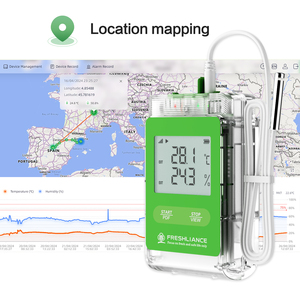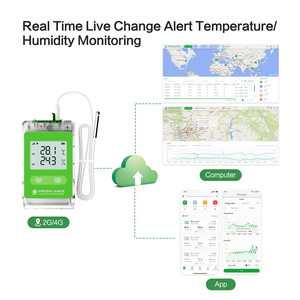
All categories
Featured selections
Trade Assurance
Buyer Central
Help Center
Get the app
Become a supplier

(25335 products available)














































GPS Tracker SDK is a development kit that allows developers to add tracking features to their apps. There are many types of GPS Tracker SDK, and each one has its own features that make it useful for different applications.
Native SDK
Native SDKs are GPS tracker SDKs developed for specific operating systems like Android or iOS. They take advantage of the device's built-in GPS and other native features to offer accurate tracking. For example, an Android SDK harnesses the Android framework to access GPS, maps, and other resources.
Cross-Platform SDK
Cross-platform SDKs are designed to work on multiple operating systems like Android and iOS. They use common programming languages and frameworks such as React Native or Flutter. This allows developers to write code once and deploy it across various platforms. For example, a tracking app built with a cross-platform SDK would run smoothly on both Android and iOS devices.
Cloud-Based SDK
Cloud-based SDKs leverage cloud services for tracking and location data. The SDK connects the mobile app to cloud services, allowing it to send and receive location information over the internet. This enables real-time tracking and location history storage without relying solely on the device's GPS. For instance, a tracking app can access location data from the cloud to provide live tracking on a web interface.
Open Source SDK
Open-source SDKs make their source code publicly accessible, allowing developers to customize and modify them as needed. This fosters community collaboration and transparency, enabling developers to contribute to the SDK's development and enhance tracking features collectively. An open-source GPS tracking SDK would allow developers to tailor the SDK to their specific tracking requirements.
Commercial SDK
Some companies offer GPS tracker SDKs to developers as a commercial product. These SDKs often come with licensing fees but provide reliable support and regular updates. Commercial SDKs may offer advanced tracking features, security, and performance optimizations that cater to professional developers' needs. For example, a commercial GPS tracking SDK might include features such as geofencing, which allows businesses to track assets within specific boundaries.
Before acquiring a GPS tracker SDK, it is important to understand its specifications and how to maintain it for effective use.
Receiver Channels
The number of channels in a GPS tracker determines how many satellites the device can communicate with simultaneously. Usually, a higher number of channels results in improved tracking accuracy and reliability.
Tracking Sensitivity
Tracking sensitivity is the ability of a GPS tracker to track locations in challenging environments such as urban areas with tall buildings or dense forests. Higher sensitivity allows for better performance in such conditions.
Update Rate
The update rate defines how often the GPS tracker updates its location data. While some SDKs have an update rate of 1-10 seconds, others can have an update rate of up to 60 seconds or more. Users should choose the update rate based on their specific tracking needs—for instance, higher rates being important for moving assets and lower rates being sufficient for stationary assets.
Power consumption
Power consumption is an important specification of a GPS tracker SDK. Low-power consumption trackers can operate for extended periods on battery power, making them suitable for long-term tracking. Moreover, some GPS trackers have power-saving features such as sleep modes or periodic reporting, further prolonging battery life.
Size and Form Factor
Different GPS trackers have different sizes and shapes. Users should choose a size and form factor that meets their tracking needs. For instance, a small and discreet tracker may be suitable for personal tracking, while a larger one may be acceptable for vehicle tracking.
Data Storage
Some GPS trackers come with internal memory for storing location data, while others rely on real-time data transmission to an external server. Internal data storage is important for offline tracking, especially in areas with poor network connectivity.
Communication Protocols
GPS trackers use different communication protocols depending on their intended purpose. While some trackers use TCP/UDP for reliable data transmission over the Internet, others use SMS for communication in remote areas with poor Internet connectivity. Additionally, some GPS trackers use HTTP/REST APIs for easy integration with web applications, while others use MQTT for lightweight communication in IoT environments.
Security Features
Security features such as data encryption, authentication mechanisms, and secure communication channels are important to prevent unauthorized access to location data and tracking devices.
Environmental Resistance
These are specifications that make a GPS tracker suitable for outdoor use in harsh conditions. For instance, a tracker with an IP67 rating is dust-tight and can withstand immersion in water up to 1 meter deep for 30 minutes. Additionally, some trackers can operate in extreme temperatures, ranging from -40°C to 85°C.
Additional Features
Additional features such as geofencing, SOS buttons, or accelerometers are important for enhanced functionality and specific use cases. For instance, the SOS button sends an emergency alert with the tracker's location, while the accelerometer detects movement or impact, enabling alerts for theft or tampering.
Maintaining a GPS tracker SDK is vital in ensuring a seamless and accurate tracking experience. Here are important maintenance tips:
Choosing the right GPS tracker SDK for a business can be a challenging task. Here are some of the things that need to be considered before making a choice:
Firstly, it is important to understand business needs. It is essential to understand the needs of the business before deciding on an SDK. Ask questions like, what does the business want to track? Is it vehicles, assets, or personal tracking? Does the business need real-time tracking or historical data? Understanding the business needs will help in selecting the right SDK that will fit the needs of the business.
Secondly, consider the features. Different SDKs come with different features. Look for an SDK that has features that will fit the needs of the business. Some of the features to look out for include real-time tracking, geofencing, historical data, speed tracking, and API integration. Select an SDK that will provide the business with the features that are important to them.
One of the most important factors to consider when selecting a GPS tracker SDK is the accuracy and reliability of the SDK. The accuracy and reliability of the SDK are very important. The business needs an SDK that will provide them with accurate and reliable tracking data. Look for an SDK that has positive reviews from other users about its accuracy and reliability.
Furthermore, ease of integration is also an important factor to consider when selecting a GPS tracker SDK. Choose an SDK that is easy to integrate with the existing system of the business. An SDK that is easy to integrate will save time and money during the integration process.
Also, consider the customization options. Different businesses have different needs. Look for an SDK that can be customized to fit the needs of the business. The customization options of the SDK will help in selecting the right features that will be useful to the business.
Lastly, consider the support and documentation. Choose an SDK that has good documentation and support. The documentation will help during the integration process and the support will assist in case of any issues. Look for an SDK that has a responsive support team to assist in case of any issues.
Some steps for the DIY and replacement of GPS tracker SDK are as follows:
Research
It is necessary to research before replacing an existing GPS tracker SDK. This is because, with research, the right hardware and software components needed for the desired functionality and compatibility with the existing system can be known.
Prepare the Device
Preparing the device entails tracking and uninstalling the existing GPS tracker and removing it carefully without damaging the vehicle's wiring or other components.
Install the New GPS Tracker
Install the new GPS tracker by following the hardware instructions to connect the vehicle's power and data lines. This can be done by mounting the tracker in a concealed location to avoid tampering.
Configure the Software
Configuring the software entails setting up a GPS tracking app or web interface to communicate with the new tracker. This includes creating an account, selecting a tracking plan, and configuring tracking parameters such as location intervals and alerts.
Test the System
Testing the system involves ensuring that the GPS tracker communicates with the tracking platform and that real-time location data is being received. It's important to conduct a test drive to verify that the tracking works under various conditions.
Notify
Notifying involves informing relevant stakeholders, such as the vehicle owner or fleet manager, about the new installation and providing them with access to the tracking system.
Q1: What is a GPS Tracker SDK?
A1: A GPS Tracker SDK is a software development kit that allows developers to integrate GPS tracking functionality into their applications. It provides libraries, tools, and documentation to access GPS data and implement tracking features.
Q2: What are the benefits of using a GPS Tracker SDK?
A2: Using a GPS Tracker SDK enables businesses to add location tracking easily, monitor assets in real time, improve operational efficiency, enhance security, and provide better customer service. It allows customization to fit specific business needs.
Q3: Is it possible to develop a custom GPS tracker using an SDK?
A3: Yes, a GPS tracker SDK can develop a custom GPS tracker. The SDK provides the necessary tools and libraries to access GPS data, allowing developers to create applications that track location information.
Q4: Can a GPS tracker SDK be used for real-time tracking?
A4: Yes, a GPS tracker SDK can be used for real-time tracking. It allows developers to access GPS data in real time and implement tracking features, enabling applications to provide live location updates and monitor movements continuously.
Q5: What is the difference between a GPS tracker and a GPS tracker app?
A5: A GPS tracker is a device that receives signals from GPS satellites to determine its location anywhere on Earth. A GPS tracker app is software that provides tracking functionality on a smartphone or other devices, using the device's built-in GPS or external GPS hardware.